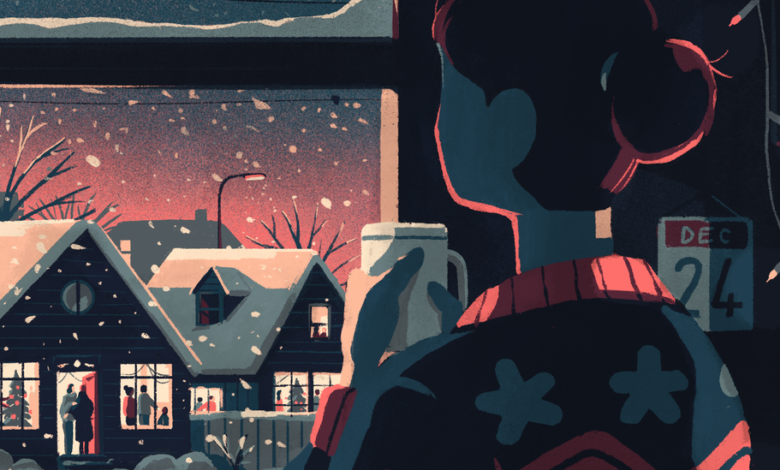An Orphan’s Guide to Celebrating Christmas

December 25th was always a day of grief for my family, and in that way for me, too.
On Christmas Day, 1950, my father’s younger brother died in his lap. A week or two before, 8-year-old P.J. had stepped on a rusted can. This was rural Ireland before the good years. Their house had no running water or heat, and the puncture wasn’t properly cleaned. As tetanus seized P.J.’s body, my grandparents knew he needed help. But the hospital was three hours away and no one in town owned a car.
A good Samaritan eventually appeared. In his back seat, my father held P.J. across his legs as they rushed to Galway — but they never made it. My young father returned from that horrific trip only to have my grandmother tell him, “Watch that your father doesn’t throw himself in the tide.” Then she went to her bed and stayed there a year.
“After that, there was no more Christmas,” my father would tell me. “Pop used always to be whistling — but after P.J. died, never again.”
The song left my father, too. As an adult, he tried to celebrate Christmas for the sake of my older sister and me. But I suspect it was never easy. After my mother died when I was 8, my sister 9, it must have been almost impossible.
He managed to put up a tree every year till we left for college. And he’d pay a friend to buy presents for us. But by late afternoon on the 25th, P.J.’s wound would be cutting into him again. Over my aunt and uncle’s dinner table, he’d start a wild drunken argument. A few times, he stormed out, leaving my sister and me behind.
My father’s holiday behavior got more chaotic as he aged. He’d refuse to leave the house on the 24th and 25th, telling my sister and me that we should do what we liked. But I couldn’t leave him alone. We’d sit in the dark living room, and at some point, he’d tell me again about P.J. — how his body got stiff as a board, how no one could help.
My father would look up from his spot on the couch to say: “This is good. I can talk to you like I used to talk to your mother.” Then he’d ask, “Why are you crying?”
“It’s just so sad,” I’d whisper.
He’d tilt his head, considering it, nodding: Maybe it was.
How do you celebrate Christmas when you have no traditions — and no family?
After my father died 10 years ago, I was left wondering.
I still had my sister, and I clung to her at first. She and her husband generously hosted me for a few years. But I didn’t matter at gatherings with their extended family like I’d mattered to my father; I was the odd one out. And the last holiday I spent with them, six years ago, left me feeling so alone in the world that I promised to make a change.
But what? As the next December blew in, I bought thrift store decorations. I put up two artificial trees, strung them with lights and topped them with Art Deco angels. I stationed wooden nutcrackers on every side table. But fussing with festoons was easier than making plans. I turned down my friends’ invitations, afraid their family gatherings would make me feel more like an orphan.
The holiday was nearly upon me when I finally arranged something: I’d make a Christmas Eve feast for my dear friend Jamie, who’d be passing my exit on I-95 on his way to his parents. Jamie is a vegan who loves stuffing and sweet potatoes, so I cooked a full table of side dishes, though the surprise hit of the meal was a tofu turkey. I sent Jamie off with the gift of a plaid flannel shirt, and went back inside to hang the ornament he’d made for me.
On Christmas morning, my sister and I opened our presents together over the phone. Late that afternoon, I pan-seared filet mignon as a special treat for myself and a recently divorced friend. I raised a sip of wine to my meat-and-potatoes father, who’d spent much of his life protesting my vegetarianism. (“A bit of steak now and then is good for you!” he’d say.)
When I served my favorite dessert — molten chocolate cake — he was with me then, too: Before P.J. died, my father tried to share with his little brother the only present he’d gotten: a rare gift of chocolates from some townsperson. But P.J. was already too far gone to chew.
For so long, I yearned to make Christmas more cheerful for my father. But his past weighed too heavily on us both. He often said to me, “I just want you to be happy.” And I’d respond, “I’ll be happy if you’re happy.” He could only shake his head.
Now, finally, I can do what I couldn’t quite do while he was alive: celebrate. This year marks the fifth annual Feast of the Faux Fowl with Jamie, and the fifth Feast of the Filets with assorted divorcées, too, amid my nutcrackers, angels and trees.
And this 25th, there will be someone new sharing my hard-won little traditions with me, a man whom I can make happy, who makes me happy, too. Over the meat and chocolate, we’ll toast my father again. And I’ll give thanks that I can do for my father what he couldn’t with P.J. — to both hold onto him and let him go.
Maura Kelly is a contributing writer at Harvard Public Health; she is working on a memoir about five years that she spent as a hermit.
Source link




